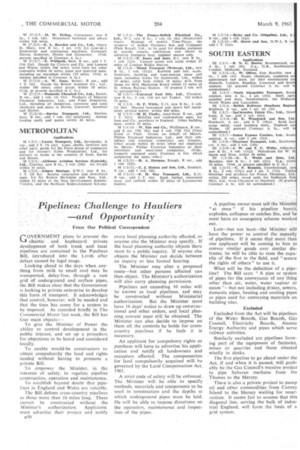Pipelines: Challenge to Hauliers —and Opportunity
Page 84

If you've noticed an error in this article please click here to report it so we can fix it.
From Our Political Correspondent
GOVERNMENT plansto prevent the chaotic anti. haphazard private development. of both trunk andlocal pipelines are contained in the Pipelines Bill, introduced into the Lords after delays caused by legal snags.
Looking ahead to the days when anything from milk to small coal may be transported, delay-free, through a vast grid of underground and surface pipes, the Bill makes clear that the Government is looking to private enterprise to develop this form of transport. It acknowledges that control, however, will be needed and that the time has come for, a system to be imposed. As recorded briefly in The Commercial Motor last week, the Bill has four main objects:—
To give the Minister of Power the ability to control development in the public interest, and set up a procedure for objections to be heard and considered To enable would-be constructors to obtain compulsorily the land and rights needed without having to promote a private Bill.
To empower the Minister, in, the interests of safety, to regulate pipeline construction, operation and maintenance.
To establish beyond doubt that pipelines in England and Wales are rateable.
The Bill defines cross-country pipelines as those more than 10 miles long. These cannot be constructed without the Minister's authorization. Applicants must advertise their project and notify B50 every local planning authority affected, or anyone else the Minister may specify. If the local planning authority objects there must be a public inquiry. If anyone else objects the Minister can decide between an inquiry or less formal hearing.
The Minister may alter a proposed route—but other persons affected can then object. The Minister's authorization will also carry planning permission.
Pipelines not exceeding 10 miles will be known as local pipelines, and may be constructed without Ministerial authorization. But the Minister must have 16 days' notice to draw up constructional and other orders, and local planning consent must still be obtained. The Minister can also decide to impose Ota them all the controls he holds for crosscountry pipelines if he feels it is necessary.
An applicant for compulsory rights or purchase will have to advertise his Application arid notify all landowners and occupiers affected. The compensation for land compulsorily acquired will he governed by the Land COmpensation Act, 1961.
A strict code of safety will be enforced. The Minister will be able to specify methods, materials and components to be used in construction and the depths at which underground pipes must be laid. He will be able to impose directions on the operation, maintenance and inspection of the pipes. A pipeline owner' must tell the Ministe "at once" if his pipeline bursts explodes, collapses or catches fire, and be must have an emergency scheme worked .out, Last—but not least—the Minister Will .haVe the power to control the capacity of pipelines. If it seems that more than one applicant will be coming to him to convey similar goods over similar distances, he will be able to state the capacity of the first in the field, and "secure the rights of others" to use it.
What will be the definition of a pipeline'? The Bill says: "A pipe or system of pipes for the conveyance of any thing other than air, water, water vapour or steam "—but not including drains, sewers, domestic pipes, heating and cooling pipes or pipes used for conveying materials on building sites.
Excluded
Excluded from the Act will be pipelines of the Water Boards, Gas Boards, Gas Council, Electricity Boards, Atomic Energy Authority and pipes which serve railway activities.
Similarly excluded are pipelines forming part of the equipment of factories, mines or quarries and those situated wholly in docks.
The first pipeline to go ahead under the Act, if and when it is passed, will probably be the Gas Council's massive project to pipe Saharan methane from the Thames to the Mersey.
There is also a private project to pump oil and other commodities from Canvey Island to the Mersey waiting for resurrection. It seems fair to assume that this diagonal line, serving the" bulk of industrial England, will form the basis of a grid system.




































































































































